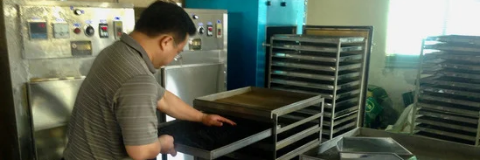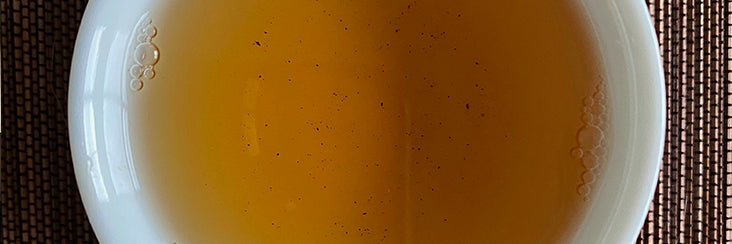Eco-Cha Tea Club

Roasted Wuyi Oolong Tea | Eco-Cha Tea Club
Batch 93 of the Eco-Cha Tea Club is a Roasted Wuyi Oolong Tea from Songboling in Nantou County, Taiwan. This plot of tea was planted about 10 years ago and has been naturally cultivated — without the use of pesticides or chemical fertilizers.

Mr. Lin’s Eco-Farmed Oolong Tea | Eco-Cha Tea Club
Batch 85 of the Eco-Cha Tea Club is the 7th anniversary commemoration of Eco-Cha's cooperation with Mr. and Mrs. Lin. Seven years ago as of this winter's harvest, Mr. and Mrs. Lin produced their very first crop of certified organic tea from their newly established farm. In support of their endeavor, we ran a crowd funding campaign to procure the entire inaugural harvest. After reaching our initial goal, we ran a booster campaign to raise funds for the renovation of the cabin on their remote homesteaded farmland where Mr. Lin was born and raised.

Wuyi Tie Guan Yin Oolong Tasting Notes | Eco-Cha Tea Club
Batch 81 of the Eco-Cha Tea Club is a first for us! A very minimal spring yield of organically grown Wuyi cultivar was processed by our source of Tie Guan Yin Oolong in the way that he usually makes tea. He planted his own plot of the Wuyi cultivar about 20 years ago on his family heritage farm in Muzha, Taiwan — but it has not been available to us until this spring. We've procured his Fo Shou Oolong before, but not his Wuyi. So, as we approach the completion of our eighth year of the Tea Club, we are excited to share a batch of tea that we've just sourced for the first time ever!

Wuyi Tie Guan Yin Oolong | Eco-Cha Tea Club
Batch 81 of the Eco-Cha Tea Club is an Wuyi Tie Guan Oolong from Muzha, Taiwan. It was made from the spring flush of this small, naturally farmed plot of the Wuyi cultivar, and processed in the traditional Muzha Tie Guan Yin fashion by our ongoing source of Tie Guan Yin Oolong Tea. This is the first opportunity we've had to procure his Tie Guan Yin Tea made from the Wuyi cultivar. His spring crop produced less than 20 kg of cured leaf. That's literally the smallest batch of Oolong that we've ever heard of!

Organic Competition Grade Oolong Tea | Eco-Cha Tea Club
Batch 69 of the Eco-Cha Tea Club was originally meant to be entered into Taiwan's National Organic Tea Competition. This competition was just established last year, in an effort to support organic tea farmers, and create more of a market presence for organic tea among Taiwanese tea lovers. This year's competition was cancelled due to COVID related restrictions, hence we were able to procure this batch of Organic Competition Grade Oolong Tea! Oh, and last year this husband and wife team received a Silver Medal Award (second place category) in this same competition!

Competition Grade Wuyi Oolong | Eco-Cha Tea Club
Batch 62 of the Eco-Cha Tea Club comes from the same plot of tea as last month's batch. When we tasted this month's batch of unroasted Wuyi Oolong, following the heavily roasted batch that we shared last month, we were inspired to offer these two very different tasting teas back-to-back. Tasting these two batches of tea that were made from basically the same raw produce (different seasonal harvests), but processed differently, provides an educational experience on how significant processing methods are in determining the final product.

Heavy Roast Wuyi Oolong Tea Tasting Notes | Eco-Cha Tea Club
We are kicking off our sixth year of the Eco-Cha Tea Club this month, with batch 61! And this month's batch of Heavy Roast Wuyi Oolong is a record breaker in that it is definitely the most thoroughly roasted batch of tea that we have shared to date. We think this tea will be appealing at this time of year — especially for our members who live in colder climates. This is a very hearty, rich, and warming brew. So we like to think it will make the holiday season even cozier!

Heavy Roast Wuyi Oolong Tea | Eco-Cha Tea Club
With natural farming, the trees mature more slowly, as they must fend for themselves and build immunity to naturally occurring pests without the artificial assistance of chemical farm products. But as our friend from whom we source this tea explained to us today, when the trees eventually develop a stable immunity, they are significantly different in their constitution than conventionally farmed tea trees. And this means the quality of leaf that is harvested from these trees is also notably different.

Eco-Farmed Specialty Roast Oolong Tea | Eco-Cha Tea Club
This batch of tea was harvested last spring, and processed as a medium oxidized Oolong. The stems were then removed in preparation for extensive roasting. Mr. Xie proceeded to roast these leaves four times in total. The first roasting was done in the standard convection type oven to remove all remaining moisture from the leaves. The following 3 roastings were done in an oven designed for roasting coffee beans!

Eco-Farmed High Mountain Oolong Tea | Eco-Cha Tea Club Tasting Notes
This crop of tea is the most recent growth picked from new branches on the trees that were allowed to grow for four months or so, similar to our recent batch of Traditional Hong Shui Oolong that we offered last month. As with last month's batch, this tea was also affected by the Green Leafhopper, and other pests. This is inevitable, given that this is an organic farm and the summer months are most susceptible to bugs!

Eco-Farmed High Mountain Oolong Tea | Eco-Cha Tea Club
We can see how naturally these tea trees are allowed to grow. It's a wholly different farming method than conventional farming, and the produce from a farm like this is also next level. In our perception, based on visiting tea farms in Taiwan for over 20 years, this source is a rare and precious find. The combination of a pristine geographic location with an ideal micro-climate for tea production, and the natural farming methods are just not to be found. In a word, we love this farms, as well as its caretakers!

Honey Hong Shui Oolong Tasting Notes | Eco-Cha Tea Club
The Chinese "hong shui" means "red water", and the term has been adopted (or revived, depending on who you ask) as a name for heavily oxidized Oolong Tea. The name is used to designate a type of Oolong to stand on its own, and not be devalued by popular judging standards and marketing trends in Taiwan. The popular High Mountain Oolong Tea is a lightly oxidized tea with a bright golden, yellowish-green color. And even the competition standards set for Dong Ding Oolong Tea are a lighter golden-orange. But Hong Shui is, in fact, a proper tea on its own, and the level of oxidation is simply a variation in processing, not a fault or shortcoming in terms of its value. The processing methods to make this type of tea are actually how tea was made in Lugu (and many other places most likely), Taiwan, before tea became a commercial commodity.
- 1
- 2

